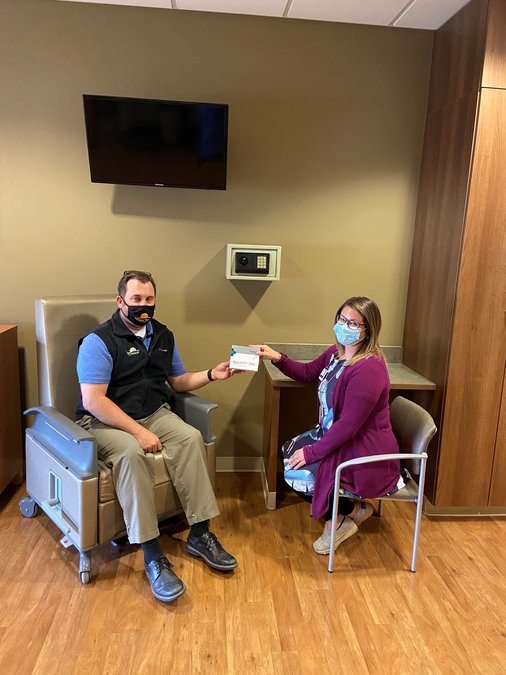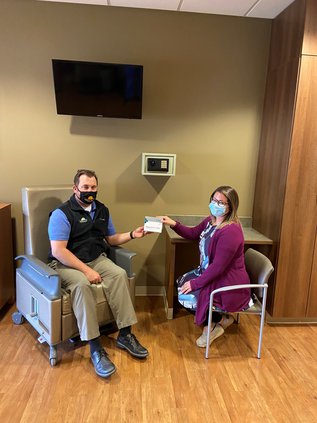A short time after Kevyn Soupiset learned about a home-based test for sleep apnea, he sought more information and scheduled the exam. He’s glad he did.
Soupiset collaborated with The University of Kansas Health System Pawnee Valley Campus and wanted to share his experience during May, Better Sleep Month.
Sleep apnea is a general term for breathing problems that occur during sleep, including breathing cessation many times during the night.
A local physical therapist, Soupiset was “very eager to be able to sleep in my more natural conditions and in my own bed. I also wanted fewer disruptions in my normal evening and morning routines.
“Since the test indicated I have mild apnea symptoms, I have made some changes in my lifestyle and sleeping habits.”
For example, Soupiset exercises more for weight loss, is more consistent with decongestants and allergy medications, and elevates his head at night in bed.
“Everything is going very well,” he commented. “There is less snoring and my wife says she has not witnessed any apnea episodes lately. There is a good chance I won’t need more formal treatment.”
Soupiset appreciates the pre-test and post-test assistance of Megan Donecker, sleep lab director and registered polysomnographer.
“Megan was tremendous from beginning to end with her scheduling, test instructions and especially with her follow-up,” Soupiset said. “She is the utmost professional. It has been great to work with her.”
Donecker noted the home-based test can be part of the solution for many patients.
“The test is convenient and the device you wear on your wrist is disposable,” Donecker said. “The only thing we need from a patient is a doctor’s referral.”
Donecker meets with patients to explain the test and its benefits at Pawnee Valley Campus in Larned and St. Rose Medical Pavilion in Great Bend, which is part of the health system.
“I go to St. Rose regularly to provide information and explain how the home-based equipment works,” she said. “We want to accommodate our patients in any way we can.”
The lab director noted sleep apnea is a risk factor that can contribute to high blood pressure, cardiovascular disease, stroke, cognitive impairment, daytime sleeping, depression, impotency, traffic accidents and increased mortality.
“We can’t emphasize enough the importance of quality sleep,” Donecker said. “It is crucial to the overall quality of life.”
She illustrated with a triangle that depicts quality of sleep, physical exercise and healthy eating. “This is the perfect triangle for improving lifestyles. If you don’t get quality sleep, one leg of the triangle is missing.”
While apnea is the most common sleep disorder, many other conditions can be diagnosed after a sleep-lab test at Pawnee Valley Campus.
The lab, which is accredited by the American Academy of Sleep Medicine, tests for sleep apnea, insomnia, narcolepsy, restless leg syndrome and periodic limb movement, to name a few.
The two sleep rooms are comparable to hotel suites, Donecker said. “Amenities include a queen-size, pillow-top mattress, large recliner chair, large bathroom and shower, television and safe for personal belongings. We offer many comforts of home.”





